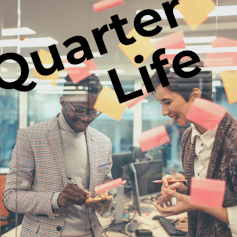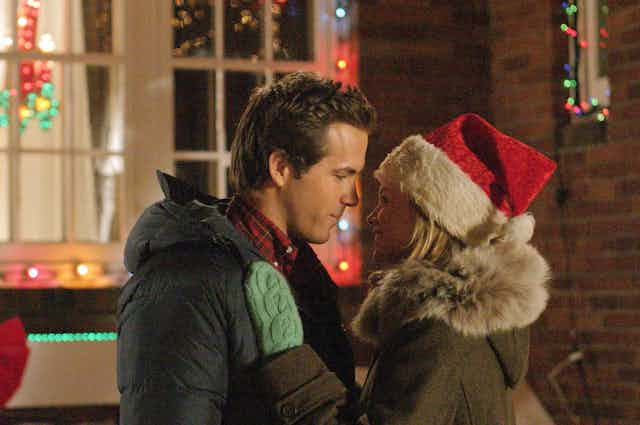The festive season seems to be a good time for love, or so many Christmas films would have us believe. One incredibly popular trope is “the return” – where the main character, usually with a successful career in the city, returns to their hometown for the festive period.
In their rustic homely surroundings, they come to realise that their life as a singleton in the city has been a sham, fall in love with some kind-hearted local hero or an old flame, et voilà – we have the magic of Christmas!
While certainly clichéd, the trope of “the return” may actually be based on a kernel of truth. Psychologists have long known that a powerful spark of attraction and romance is familiarity. In contrast to the commonsense idea that familiarity breeds contempt, familiarity actually breeds liking.
So if you, like these cinematic heroes and heroines, are looking for love in your hometown this Christmas, here is the evidence that might help you with your search.

This article is part of Quarter Life, a series about issues affecting those of us in our twenties and thirties. From the challenges of beginning a career and taking care of our mental health, to the excitement of starting a family, adopting a pet or just making friends as an adult. The articles in this series explore the questions and bring answers as we navigate this turbulent period of life.
You may be interested in:
Five dating tips from the Georgian era
Workplace romance: four questions to ask yourself before dating someone from the office
Online dating fatigue – why some people are turning to face-to-face apps first
The allure of the familiar
In one classic American study, researchers had four women attend university classes in different frequencies. One never went to class, another attended five classes, the third attended ten, and the fourth attended class 15 times over a semester.
At the end of the semester, it was found that the more classes the women attended, the more other students liked them and wanted to spend time with them. Familiar faces are not only liked more, they are also more likely to make us smile.
One reason why familiar stimuli tend to be liked is because our brains process them more easily – or “fluently”, in the parlance of neuroscientists – and this fluency is experienced more positively.
Evolutionary factors may also play a hand in shaping our reactions to familiar people. In general, novel stimuli tend to breed feelings of uncertainty and result in wary reactions. But greater familiarity usually means we know the stimulus to be harmless and we’re more likely to respond favourably as a result.
So, when the main character in a Christmas movie returns to their hometown, familiarity fosters attraction because they seek the positive rewards that familiar others provide. Feelings of comfort and safety with others contribute to liking. Indeed, so powerful is the effect of familiarity that some psychologists have said it is “perhaps the most basic” of all principles of attraction.
Beauty maps
Familiarity may also work its magic in a more global sense. To show this, I attempted to put together an empirical “beauty map” of London. Over 400 participants in each of London’s 33 boroughs were asked to rate how attractive they thought people in each of the boroughs were, as well as how familiar they were with each borough.
Our data showed that people in richer boroughs tended to be rated as more attractive than those from poorer boroughs. But more interesting was the fact that attractiveness ratings were also strongly associated with ratings of familiarity. When participants were more familiar with a borough, they rated its residents as more physically attractive. Although limited to London, what this study shows is that our understanding of geographical space can impact who we think is attractive.
In another study conducted in the Netherlands, researchers interviewed residents in the village of Vriezenveen about the effects of geography on partner choice. Residents preferred partners from their own village, who were more familiar and had similar knowledge that comes from sharing an upbringing in the same neighbourhood.
In contrast, residents of villages further away were perceived as being less trustworthy, “a different sort of people”. Even the littlest things – like washing windows on a Sunday – were taken as evidence of that difference. Such beliefs matter because they can affect who we interact and form relationships with. If you believe that people from your hometown are more familiar and trustworthy, then it would make sense to find yourself a partner there.
So if you’re single this Christmas, might it be a good idea to head back to your hometown? The people there will be more familiar, but bear in mind that real life is not a Christmas movie. Just because the trope of “the return” may have a kernel of truth, doesn’t mean that it’s a principle by which to organise your life.

